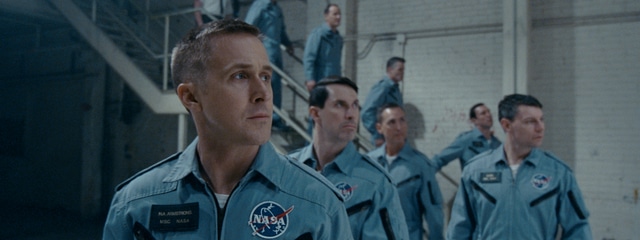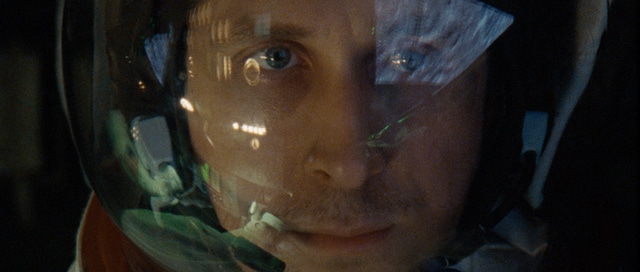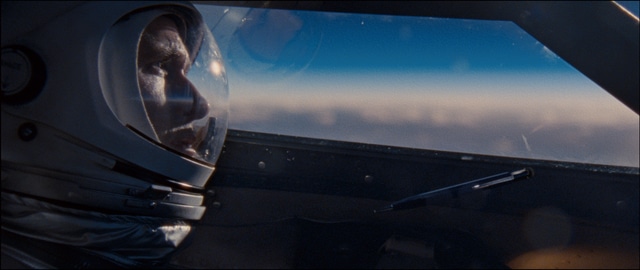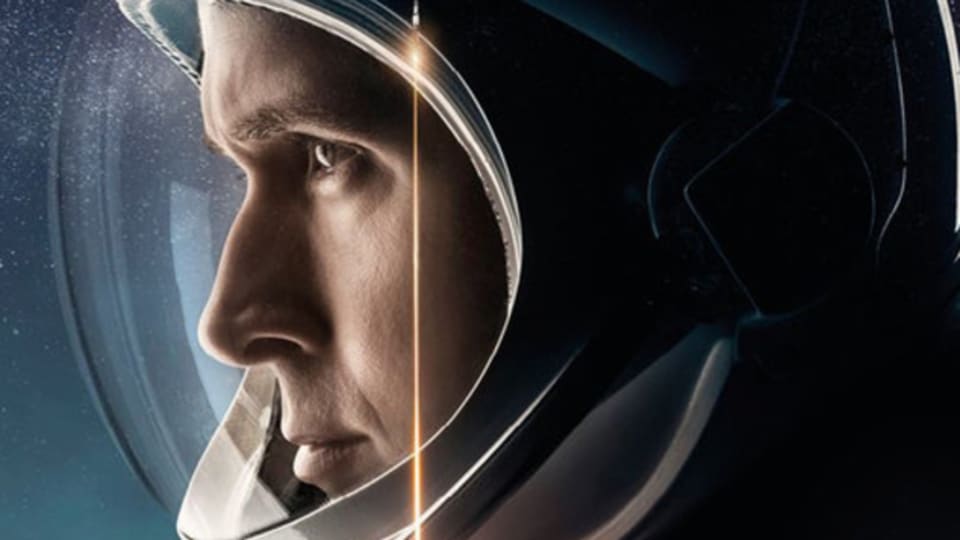First Man is out now across all home entertainment platforms including Blu-ray & DVD. The ground-breaking movie is a true masterpiece that stars Ryan Gosling as astronaut Neil Armstrong. Based on the book First Man: The Life of Neil A. Armstrong by James R. Hansen, visionary filmmaker Damien Chazelle (La La Land) brings this extraordinary story to life.
First Man is the riveting story behind the first manned mission to the moon, focusing on Neil Armstrong and the decade leading to the historic Apollo 11 flight.
Check out our review of First Man
The film stars Ryan Gosling alongside Claire Foy (The Crown) as Janet Armstrong in the heroic and emotionally driven journey through a pivotal moment in the history of mankind.
James R. Hansen is the only authorised biographer of Neil Armstrong’s journey to the moon. He is a professor of history of Auburn University and he had the only official inside look into the life of America’s most famous astronaut. James also served as co-producer on First Man and made a cameo appearance onscreen too.
We caught up with James to discuss how the book came to be, and his extensive work on the movie itself, along with his recollections of his time spent with Neil Armstromg.

If I could take you back to the beginning, can you recollect where you were when the Moon landing took place, and can you describe the atmosphere and excitement of watching this historic event take place live?
I lived in Fort Wayne, Indiana, had just turned 17 years old, and was spending most of the summer preparing for and taking my college entrance exams. I also had a summer job at a golf course, but, as the Apollo 11 landing took place on a Sunday, I was off-work. I stayed in front of the television all day and till the moonwalk was over just after midnight Eastern Standard Time. This was long before the development of VCR or DVR technology, so the only way to record anything off a TV, was to take a snapshot of it with a photographic camera, which I did.
I took several snapshots of the TV screen that day, especially as Neil Armstrong was coming down the ladder and first stepping onto the moon.
How did the project of writing the biography first come about?
I had been researching and writing about the history of flight—both aeronautics as space—for about 20 years by the time I got the idea—in 1999–of writing Neil’s life story. He interested me because he had had an impressive career as an engineering research pilot before becoming an astronaut, and he also had flown 78 combat missions in Korea, which interested me. Then, of course, he was the most famous, yet least known, of the early American astronauts, and that intrigued me. Also, he instantly became a global icon when he became the First Man on the moon—so I knew the book would not just be a biography, it would be an iconography. I would also be study all the different cultural meanings that had been projected onto Neil over the years, so the book would also be a study of “us” not just of him.
Can you tell us about the first time you met Neil Armstrong, and when did you find out that a film adaptation of First Man was being considered?
I first contacted him by letter; his reply was very cordial but was basically a polite no—he was still active with some of his corporate responsibilities and told me he wouldn’t have the time to invest in my project. A few months later I sent him a box with a couple of the books I had published, as a gift for his 70th birthday, in 2000. He thanked me subsequently in a letter and said he liked the way I approached my subject matter — not sensationally or over-dramatically but as a committed scholar in aerospace history and the history of technology. He concluded by saying, “let’s stay in touch.”
Several months later he invited me to his home in suburban Cincinnati. We chatted for an entire afternoon, and, although it still took another year before he gave me the green light, I knew after that afternoon that we were on the same wave length and that things were probably going to work out.
As for the movie, Hollywood came calling in the form of actor-director Clint Eastwood as soon as the book deal got announced; I had not even gotten a good start on the book yet. Eastwood invited Neil and me and our wives to his private golf club in California — we played golf and chatted about the movie possibility. Clint and Warner Brothers did get the rights to the book but ultimately decided not to go ahead with it. That’s when Universal Pictures came in and purchased the rights. Neil had nothing to do with the movie deals. It was my book, Neil always emphasized, and he would not have wanted to have been part of a movie deal, anyway.

As a writer, did you feel any trepidation in your work being translated to the big screen?
Although it was a very exciting experience for me to help bring this brilliant film to fruition as its Co-Producer, it was also full of stress. I worked hard to keep the movie as genuine and honest to the real characters and historical events as possible, especially as they related to Neil himself, as I had been entrusted by Neil to serve as his only authorized biographer. It was my first experience turning on of my books into a motion picture and I learned many important lessons—some of them hard lessons—along the way.
First and foremost, I learned that the goal of even a history-based film is not to create a documentary but rather to produce a moving, entertaining, and emotionally provocative theatrical experience for an audience sitting in a darkened room before a large silver screen. A beautiful film requires a great deal of artistry and must allow for some dramatic license with the actual historical events. As our screenwriter Josh Singer told me early on, movies are entertainment. If they aren’t entertaining, nobody shows up. And if nobody shows up, it doesn’t matter how interesting or thought-provoking your historical thesis is. You can’t get people to engage if you don’t get them into the theater. But I also learned that these two goals, good story and good history, are not mutually exclusive. Dramatic fictions can be kept to a minimum and used only when absolutely necessary for the purposes of the film.
What’s it like working with Damien Chazelle (Director) and what does he bring to the table?
Damien is a brilliant, creative filmmaker and a wonderful man. We exchanged a lot of ideas, most of them privately. He always responded thoughtfully and generously whenever I offered ideas, which happened pretty often, as I was on set virtually every day. It helped that his mother is herself a university professor and historian, so he was accustomed to the kind of ideas I would offer. I was totally impressed with how he handled the actors and the entire crew, never a harsh word. He seemed to me very playful, very artistic, a true genius. He is our next Stanley Kubrick, I believe, in terms of the range, power, and diversity of the film he will give the world over the next half century. How he did not get a nomination as Best Director at BAFTA or the Oscars is insane! There is no way any director did what Damien had to do to prepare and shoot this very complicated film.
First Man is a groundbreaking film in many respects, but the Moon landing sequence in particular was the best depiction of the event that I’ve ever seen committed to film. What was your experience of watching that sequence come together?
Totally amazing — it was like really being with Apollo 11 on the Sea of Tranquility, when, in fact, we were in a stone quarry just south of Atlanta, Georgia. Our brilliant production designer, Nathan Crowley, was responsible for much of that, and our cinematographer Linus Sandgren did a fantastic job figuring out how to light the set so it would very exactly replicate the optical conditions of being on the surface of the Moon. For neither of them to win at BAFTA or to even get an Oscar nomination was criminal, in my view.
Ryan Gosling puts in a tremendous performance – did you collaborate on his role at all?
Ryan’s portrayal of Neil Armstrong has been so grossly underrated that it is hard for me to get angry when I think about it. Neil was a very quiet, introspective, cerebral, and complicated man, and Ryan did an unbelievable job offering us subtle and compelling insights into who Neil was. He did a tremendous amount of research into Neil’s character, talking to family friends, fellow astronauts and pilots.
He read my book with great care. He came to me many times with questions about Neil, and he was especially interested to learn what I thought about how various scenes and their dialogue were coming across. Actually, Ryan reminded me of Neil a great deal—personality-wise, I think they are very much alike. As in Damien’s case, it is stunning to me that the movie industry, and the movie critics, don’t have a smarter understanding of what it took to truly depict Neil or make this film. Freddy Mercury and Dick Cheney are both a piece of cake to portray compared to Neil!

First Man also features your acting debut – how was it working on the film, and would you like to do more work in-front of the camera?
Ha! No, I only appeared in the film because Damien asked me to do so. I was in the scene when the astronauts walk out of crew quarters to get in the van and head to the pad for the launch of Apollo 11. I am standing at the rail, playing the part of Dr. Kurt Debus, who was the director of Kennedy Space Center and one of the German rocketeers that came from Germany after World War II with Von Braun. I had practiced a line of dialogue I wrote for myself, with a German accent, but I knew there would be no place for it in the movie. My only other acting was playing Shakespeare’s Romeo in our ninth-grade class play; that experience was such a disaster I never again thought of accepting an acting role!
You have a live audience in your day job as a Professor of History at Auburn University in Alabama. What reaction did your students have to the film, and how do you see the young minds of today in terms of their desire to achieve similar feats and explore new frontiers ahead?
After 32 years of teaching I retired from the university in May 2018 so I could devote all the time needed for the film. But I have stayed in touch with many of my students that I taught both at the undergraduate and graduate level.
We had two early screenings of the film at Auburn and both times we filled a theater of 350 capacity to the brim; Universal Pictures told me that the film “tested” at Auburn the best that it did at any screenings anywhere, which pleased me greatly. I certainly hope the film proves to be inspirational to young people all over the world. It tells them to “dream big” but that the accomplishment of great goals like the Moon landing requires a tremendous amount of hard work and sacrifice.
British Astronomer Sir Patrick Moore said ‘This is an important book and should be in every scientific library’ and US news legend Walter Cronkite called it ‘a book for all time’. It must have been such an honour to receive such accolades for your work. What was Neil’s reaction to the book, and how did you find working with him?
I am especially pleased that, by the time of the 50th anniversary of Apollo 11 this July, my book will have been translated into 24 different languages. The first Moon landing was “For All Mankind” and people all over the world were proud that “we”—the human family”—had achieved it in that way. As for Neil, he gave a wonderful compliment when I finished the book: he told me, “Jim, you have written exactly the book that you told me you were going to write.” That may not sound like much of a compliment, but coming from Neil, a person that many people over the course of his post-Apollo 11 life had tried to fool or manipulate, it was a marvelous thing for me to hear.

With so many significant landmarks in Space exploration achieved by humankind, where do you see the next 10 years going, and what do you think the future holds for our species – especially with the environmental challenges that our world faces today?
We are going back to the Moon; there is every reason to believe that. But I don’t think it will necessarily be the United States who will do it first in the next decade or so; it could very well be the Chinese. I don’t think it really matters who it is. The Moon is going to be a very regular place for human visitation in the next quarter century and it will done for various purposes. Personally, what I look forward to the most is a permanent astronomical observatory on the Moon’s far side, which is the best place in the inner solar system to monitor low-frequency radio waves and thereby detect the faint ‘fingerprints’ left by the Big Bang. With such lunar-based telescopes we will be able to look back to the beginning of it all; the photos from the Hubble Space Telescope, as impressive as they have been, will pale in comparison to what we see in a telescope from the far side of the Moon.
Finally, do you think Neil would have liked the movie, and Ryan Gosling’s portrayal of him?
Neil may have chosen not even to have seen the movie—he was so modest and he would have been embarrassed to see himself as the singular focus of anything related to Apollo. He always emphasized that it took over 400,000 people—from government, industry, and academe—to accomplish the Moon landing and he was very uncomfortable getting more attention than he thought he deserved. I am confident that Neil would have gladly met with Ryan Gosling for a long chat, answering all of Ryan’s questions, and I know Ryan would have loved for Neil to have still been living so he could have gotten to know him.
I also think that Neil would have been fascinated by the technical making of the film—the production design, the special effects, the cinematography, the sound design, everything technical. As an engineer himself, that’s the sort of stuff he loved and that made him tick.
First Man is out now on Digital, 4K, Blu-ray & DVD from Universal.


